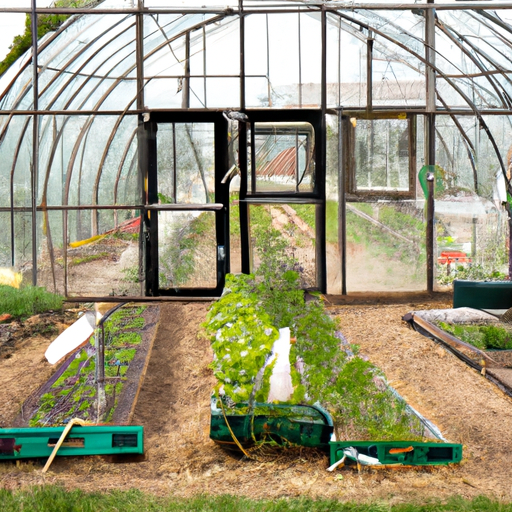Sustainable urban food production has emerged as a key strategy to address pressing issues such as food insecurity, environmental degradation, and economic inequality in cities around the world. This report outlines the benefits and challenges of sustainable urban food production, with a focus on how it can contribute to solving these key issues. By promoting localized food systems, leveraging technology and innovation, and fostering social and economic benefits for communities, sustainable urban food production holds immense potential for transforming urban landscapes and improving the well-being of residents.
Key benefits of sustainable urban food production include increased access to fresh, nutritious food, reduced carbon emissions from transportation, and enhanced community resilience in the face of economic and environmental challenges. Moreover, urban agriculture can create jobs, promote social cohesion, and empower marginalized communities to take control of their food systems. To illustrate the feasibility and impact of these initiatives, this report provides case studies of successful urban food production projects from diverse regions, showcasing the positive outcomes that can be achieved through sustainable farming practices.
While the benefits of sustainable urban food production are clear, there are also significant challenges that must be addressed in order to realize its full potential. These challenges include limited land availability, resource constraints, and the need for robust community engagement and support. By adopting a holistic approach that integrates land use planning, sustainable resource management, and stakeholder collaboration, cities can overcome these challenges and create thriving urban food systems that benefit all residents.
To support policymakers and urban planners in implementing sustainable urban food production strategies, this report offers a clear roadmap for action. By prioritizing investments in urban agriculture, incentivizing sustainable farming practices, and fostering partnerships between government, businesses, and community organizations, cities can create an enabling environment for sustainable food production to flourish. By following the recommendations outlined in this report, cities can harness the power of sustainable urban food production to achieve a more equitable, resilient, and environmentally sustainable future for all.
Introduction
Urbanization is a global trend that is rapidly transforming the way we live, work, and eat. As more people move to cities in search of economic opportunities and a better quality of life, the demand for food in urban areas is escalating. This trend is putting pressure on existing food systems, leading to issues such as food insecurity, environmental degradation, and economic inequality. In response to these challenges, sustainable urban food production has emerged as a viable solution that can help cities become more self-sufficient, resilient, and environmentally sustainable.

Sustainable urban food production encompasses a range of practices, including urban agriculture, rooftop gardening, vertical farming, and community gardens. These practices share a common goal of producing food in urban environments in a way that minimizes environmental impact, promotes social equity, and enhances community well-being. By promoting localized food systems, reducing food miles, and fostering community engagement, sustainable urban food production has the potential to address a wide range of issues facing cities today.
Benefits of Sustainable Urban Food Production
1. Improved Food Security: One of the primary benefits of sustainable urban food production is increased access to fresh, nutritious food for residents, particularly in food deserts and low-income neighborhoods. By growing food locally, cities can reduce their reliance on imported produce and ensure a more stable and resilient food supply.
2. Environmental Sustainability: Sustainable urban food production can help cities reduce their carbon footprint by minimizing the energy and resources required to transport food from rural areas to urban markets. By promoting sustainable farming practices such as organic agriculture, agroecology, and permaculture, cities can also protect natural resources, enhance biodiversity, and mitigate the impact of climate change.
3. Economic Development: Urban agriculture has the potential to create jobs, stimulate economic growth, and support local businesses. By investing in sustainable food production, cities can generate revenue, attract investment, and promote entrepreneurship in the agricultural sector. Moreover, urban farming can provide opportunities for training, education, and skills development for residents, particularly those from marginalized communities.
4. Social Cohesion: Sustainable urban food production can foster social cohesion, promote community engagement, and strengthen social networks in cities. By bringing people together to grow, harvest, and share food, urban agriculture can build trust, cooperation, and solidarity among residents, leading to a more resilient and inclusive urban community.
5. Health and Well-being: Access to fresh, locally grown food has numerous health benefits, including reducing the risk of diet-related diseases such as obesity, diabetes, and heart disease. By promoting healthy eating habits and increasing the availability of fruits, vegetables, and other nutritious foods, sustainable urban food production can improve the well-being of residents and reduce healthcare costs associated with poor nutrition.

Case Studies of Successful Urban Food Production Projects
1. Growing Power, Milwaukee, USA: Growing Power is a non-profit organization based in Milwaukee that has transformed vacant lots, rooftops, and abandoned buildings into thriving urban farms. By using sustainable farming techniques such as vermiculture, aquaponics, and composting, Growing Power has been able to produce a diverse range of fruits, vegetables, and herbs for local residents, restaurants, and farmers markets.
2. Klong Toey Community Farm, Bangkok, Thailand: The Klong Toey Community Farm is a grassroots initiative that is helping to address food insecurity in one of Bangkok’s largest slum communities. By converting unused land into productive vegetable gardens, the farm is providing residents with access to fresh, affordable produce, as well as opportunities for employment, education, and social empowerment.
3. Lufa Farms, Montreal, Canada: Lufa Farms is an innovative urban agriculture company that operates rooftop greenhouses in Montreal, producing a wide variety of vegetables year-round. By using hydroponic systems, energy-efficient technology, and renewable energy sources, Lufa Farms has been able to reduce water consumption, energy use, and carbon emissions, while providing customers with local, sustainable produce through its online delivery service.
Challenges of Sustainable Urban Food Production
1. Limited Land Availability: In densely populated cities, finding suitable land for urban agriculture can be a major challenge. Competition for land use, zoning regulations, and land ownership issues can restrict the expansion of urban farming projects and limit their impact on food security and economic development.
2. Resource Constraints: Sustainable urban food production requires access to resources such as water, soil, and energy, which may be limited in urban environments. Managing these resources effectively, minimizing waste, and optimizing resource use are critical challenges that urban farmers must address to ensure the long-term viability of their operations.
3. Community Engagement: Engaging residents, businesses, and policymakers in the development and implementation of urban food production projects is essential for their success. Building trust, fostering collaboration, and addressing the needs and concerns of diverse stakeholders are key challenges that must be overcome in order to create sustainable and inclusive urban food systems.
4. Policy and Regulatory Barriers: In many cities, outdated regulations, lack of government support, and institutional barriers can hinder the growth of sustainable urban food production. Addressing these policy challenges, advocating for supportive legislation, and creating an enabling environment for urban agriculture are critical steps that cities can take to promote sustainable food systems.
Recommendations for Policymakers and Urban Planners
In order to promote sustainable urban food production and realize its full potential, policymakers and urban planners can take the following actions:
1. Promote Land Use Planning: Integrate urban agriculture into city planning processes, designate land for food production, and support the development of mixed-use zoning regulations that allow for diverse types of agricultural activities in urban areas.
2. Incentivize Sustainable Farming Practices: Provide financial incentives, tax breaks, and technical assistance to urban farmers who adopt sustainable farming practices, invest in renewable energy, and implement water-saving technologies in their operations.
3. Foster Community Partnerships: Build partnerships with local communities, businesses, schools, and non-profit organizations to support urban food production projects, provide training and education, and promote food access and equity in underserved neighborhoods.
4. Invest in Research and Innovation: Support research, development, and innovation in urban agriculture technologies, sustainable farming methods, and food production systems that can enhance productivity, reduce environmental impact, and improve the resilience of urban food systems.

Conclusion
Sustainable urban food production has the potential to transform cities into more resilient, equitable, and sustainable communities by addressing key issues such as food insecurity, environmental degradation, and economic inequality. By promoting localized food systems, leveraging technology and innovation, and fostering social and economic benefits for communities, cities can create thriving urban food systems that benefit residents, businesses, and the environment.
By following the recommendations outlined in this report, policymakers and urban planners can take concrete steps to promote sustainable urban food production in their cities, drive positive change, and create a more inclusive and sustainable food system for all. By working together to overcome the challenges and seize the opportunities presented by urban agriculture, cities can build a brighter future for themselves and their residents, one harvest at a time.
Read More: How to Build Hydroponic Floating Raft and Strawberry Towers


